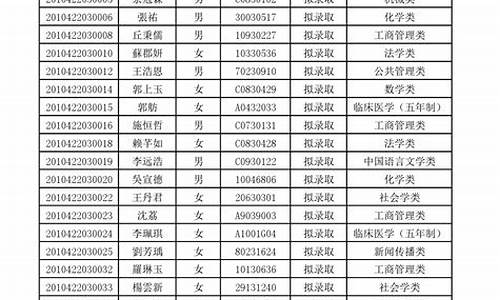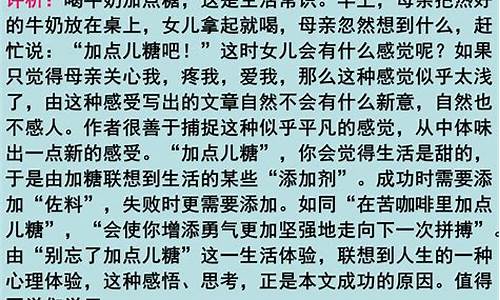您现在的位置是: 首页 > 教育新闻 教育新闻
高考英语考点归纳,高考英语考点归纳表
tamoadmin 2024-05-22 人已围观
简介1.高中英语所有知识点 高考英语语法知识点一般过去时①一般过去时的基本用法:表示过去的事情、动作或状态常与表示过去具体的时间状语连用(或有上下文语境暗示);用于表达过去的习惯;表示说话人原来没有料到、想到或希望的事通常用过去式。如:I met her in the street yesterday.I once saw the famous star here.They never drank w
1.高中英语所有知识点

高考英语语法知识点
一般过去时
①一般过去时的基本用法:表示过去的事情、动作或状态常与表示过去具体的时间状语连用(或有上下文语境暗示);用于表达过去的习惯;表示说话人原来没有料到、想到或希望的事通常用过去式。如:
I met her in the street yesterday.
I once saw the famous star here.
They never drank wine.
I thought the film would be interesting,but it isn’t.
②如果从句中有一个过去的时间状语,尽管从句中的动作先于主句发生,但从句中的谓语动词连用过去式。如:
③表示两个紧接着发生的动作,常由以下词语连接,用一般过去时。如:but, and, when, as soon as, immediately, the moment, the minute。
The moment she came in, she told me what had happened to her.
He bought a watch but lost it.
④常用一般过去时的句型:
Why didn’t you / I think of that?
I didn’t notice it.
I forgot to tell you I had been there with my brother before.
I didn’t recognize him.
高考英语知识要点
1.表示“大量、许多”
可数:number/many/dozen/a great number 不可数:a great deal/amount/much 都可以:plenty of/lot/quantity/mass
2.可以修饰形容词比较级:far/even/any/much/rather/a bit/a lot
3.lie躺-lay-lain-lying 撒谎-lied-lied-lying
Lay下蛋-laid-laid-laying
4.can表示能力,be able to表示经过努力,有时态变化
5.receive强调客观接收,accept强调主观接受
6.on account of因为,由于;account for说明原因解释
7.accuse sb of指控某人,sue指控
8.add to增加扩大,add up加起来,add up to总共总计
9.afford负担得起,抽得出时间
10.after以过去为起点,用于过去时态,in以将来为起点,用于将来时态
高中英语所有知识点
英语作为我们的第二门语言,在高考会怎么考核考生呢?有哪些英语知识点,下面是我为大家整理的关于江苏高考英语知识点,希望对您有所帮助。欢迎大家阅读参考学习!
江苏高考英语知识点
S+V(是系动词)+ P
1. This │is │an English-Chinese dictionary.
2. The dinner │smells │good.
3. He │fell │in love.
4. Everything │looks │different.
5. He │is growing │tall and strong.
6. The trouble │is │that they are short of money.
7. Our well │has gone │dry.
8. His face │turned │red.
附:
联系动词(Link Verb)本身有词义,但不能单独用作谓语,后边必须跟表语(亦称补语),构成系表结构说明主语的状况、性质、特征等情况。
有些系动词又是实义动词,该动词表达实义时,有词义,可单独作谓语,例如:
He fell ill yesterday.他昨天病了。(fell是系动词,后跟补足语,说明主语情况。)
He fell off the ladder. 他从梯子上摔下来。fell是实义动词,单独作谓语。
1)状态系动词
用来表示主语状态,只有be一词,例如:
He is a teacher. 他是一名教师。(is与补足语一起说明主语的身份。)
2)持续系动词
用来表示主语继续或保持一种状况或态度,主要有keep, rest, remain, stay, lie, stand, 例如:
He always kept silent at meeting. 他开会时总保持沉默。
This matter rests a mystery. 此事仍是一个谜。
3)表像系动词
用来表示"看起来像"这一概念,主要有seem, appear, look, 例如:
He looks tired. 他看起来很累。
He seems (to be) very sad. 他看起来很伤心。
4)感官系动词
感官系动词主要有feel, smell, sound, taste, 例如:
This kind of cloth feels very soft. 这种布手感很软。
This flower smells very sweet. 这朵花闻起来很香。
5)变化系动词
这些系动词表示主语变成什么样,变化系动词主要有become, grow, turn, fall, get, go, come, run.
He became mad after that. 自那之后,他疯了。
She grew rich within a short time. 她没多长时间就富了。
6)终止系动词
表示主语已终止动作,主要有prove, turn out, 表达"证实","变成"之意,例如:
The rumor proved false.这谣言证实有假。
The search proved difficult.搜查证实很难。
His plan turned out a success. 他的计划终于成功了。(turn out表终止性结果)
高考 英语 作文 必考考点
1.经济的快速发展 the rapid development of economy
2.人民生活水平的显著提高/ 稳步增长the remarkable improvement/ steady growth of people’s living standard
3.先进的科学技术 advanced science and technology
4.面临新的机遇和挑战 be faced with new opportunities and challenges
5.人们普遍认为 It is commonly believed/ recognized that…
6.社会发展的必然结果 the inevitable result of social development
7.引起了广泛的公众关注 arouse wide public concern/ draw public attention
8.不可否认 It is undeniable that…/ There is no denying that…
9.热烈的讨论/ 争论 a heated discussion/ debate
10. 有争议性的问题 a controversial issue
11.完全不同的观点 a totally different argument
12.一些人 …而另外一些人 … Some people… while others…
高中英语易错点归纳
1.在你离开之前,有些事应该要告诉你。(ought to;there be)
学生错例:
1)Before you leave, there are somethings I ought to tell you.(受中文“些”字意思影 响,误把单数的something 当somethings)
2)Before you leave,there are some things ought to tell you.
(误用something; 句子 成分残缺,从句漏了主语 I)
3)There are something that ought to tell you before you leave.
4)There is something ought to tell you before you leaving.(受中文“在”影响,误用了“leaving”)
2.我很难把学习和兴趣结合起来。(combine...with...)
学生错例:
1)I'm difficult to combine study with interest.(典型的中文翻译思维,与地道的英语表达有较大差别)
2) I hardly combining study with interest.(中式英语)
3)It's hardly that combine study with interest.(乱套句型)
4)I hardly combine study with interest.(照字翻译)
高考英语语法考点一
1. 语态和时态
—Do you see those people on the little sandy island?
—Yes, they _______ handkerchiefs for the last half hour. I wonder why.
A. were waving B. waved C. had waved D. have been waving
正确答案D
高考考点考查动词时态。现在完成进行时:表示一个从过去某一时刻开始的动作,一直延续到说话时还在进行或刚结束,句中常出现用for, since, how long等引导的时间状语。e.g. His telephone has been ringing for a long time.e.g. It has been raining since last Sunday. e.g. How long have you been wearing glasses?
题干句意“你有没有看见那些在小岛上的人?”“是的,我看见了。他们在过去的半小时里一直在挥手帕,我不知道为什么。”
详细解析这个挥手帕的动作是在半小时前开始的,然后一直在挥,一直挥到了说话的这个时候,所以我们用的是一个现在完成进行时,强调一个动作的持续。我们再来看一下其他几个时态:
A选项是were waving——过去进行时,它指的是:①过去某一时刻正在进行;②过去某一阶段正在进行;B. waved——过去时,过去某时间发生的且已完成的动作,所以我们知道A和B这两个时态都是和过去有关,而和现在是没有一点关系的,所以A和B这两个答案错了。
C. had waved——过去完成时:过去某一时刻或某一动作前完成的动作或状态,那么它所表达的时候是在过去的过去,例如:e.g. By the end of last year, we had built 5 new schools.到去年年底为止,我们已经建造了5所学校。首先,过去的时间是去年年底;而句子表达的意思是在去年年底之前,所以我们用过去完成时——had build.和现在是更加没有联系了,所以这个答案也是不正确的。
题干中的时间状语是“for the last half hour”,注意这个last不是指“最后的”,而是指“刚才的——在刚才的半个小时里”,那么往往呢句中出现last,或者是last half hour、recent这种词的话,我们一般都会选择现在完成进行时,因为它指的是“刚才”,那么肯定指“从刚才到现在”。所以本题答案是D.
高考英语语法考点二
名词性从句
The information could be helpful to ____will take over the job.
A. those B. who C. whoever D. anyone
正确答案C
高考考点考查名词性从句,顾名思义就是名词,它可充当主语、表语、宾语和同位语,所以相应的名词性从句也分为有主语从句、表语从句、宾语从句和同位语从句。此题考的就是介词to后的宾语从句。
题干句意“这个消息可能会对任何将接管这个工作的人有所帮助。”whoever = anyone who“任何怎么怎么样的人”所以这个答案是正确的。我们再来看其他几个答案为什么不对呢?
详细解析A选项是those,如果those填在这里的话就会变成缺少关系代词who,如选those,那those will take over the job“那些人将会取代这个工作”,它就变成了一个独立的句子,而不是一个从句,更加就不是一个宾语从句了,所以从原则上说它是错误的,那么怎样改才是正确的呢?很简单,只要在这个those的后面加一个关系代词who,把它变成一个定语从句——those who will take over the job,“那些将要接管这个工作的人”,那么这样就可以了。
B选项是who在名词性从句中表示疑问,e.g. Who will take over the job has not been decided yet. D选项是anyone,错误的原因也是缺少关系代词who.
比较those who和anyone who,前者是“那些……的人”,后者表示“任何……的人”。区别就是在于those who是一个复数的概念,“那些人”,后面的谓语动词要用复数;而anyone who是表示任何一个人,后面要用单数的谓语动词。
高考英语语法考点三
虚拟语气和情态动词
—David, we went to Lake Geneva for the weekend.
—That _______ a very nice change. I wish I had gone there.
A. must be B. must have been C. could be D. could have been
正确答案B
高考考点考查情态动词。
首先A和B里面都有must,must表推测,它表示“肯定…”,这个语气是非常确定的,百分之百的;那么当must表推测的时候呢,它还可以表示不同的时间,例如:
第一,must be表示的是“现在的状态”,He must be a teacher. 他肯定是一个老师。
第二,must be doing表示“现在进行的动作”,They must be having a meeting in the office.他们现在肯定正在办公室里开会。
第三,must have done表示“过去发生的事情”,You must have met him yesterday.你昨天肯定见过他了。让我们看一下将“must have been”填到题干里面是否正确?句意:“David,我们周末去了日内瓦湖。”“哦,那肯定是一个非常好的改变,我希望我也去那里了。”这里是表示一个肯定的推测;又因为是上个周末的事情,说明这件事情已经发生了,我们所以用B. must have been,而不是A。
详细解析C选项是could轻微的怀疑或委婉的陈述看法,“可能”e.g. His story could be true, but I hardly think it is.他所说的这个 故事 可能是真的,但是我基本上不相信。
D选项是could have done虚拟语气,某事过去有可能发生而实际没有,“本来可以”,表示惋惜、遗憾 e.g. The accident could have been prevented.这个车祸原本是可以避免的。e.g. You could have done better, but you didn’t try your best.你原本是可以做的更好的,但是你并没有尽自己最大的努力。
江苏高考英语知识点相关 文章 :
★ 江苏高考英语作文预测
★ 2017江苏高考英语作文模板
★ 2017江苏卷高考英语作文素材
★ 2017江苏高考英语作文题目预测
★ 2017高考英语作文江苏
★ 2017年江苏高考英语完形填空专题提升训练题附答案
★ 2018年江苏省高考英语作文(2)
★ 2017江苏省高考英语作文怎么写
★ 2015年江苏高考英语作文范文
高中英语知识点总结一、语言知识(名词、冠词、数词、代词、动词、形容词、副词)1、名词.概念 名词是表示人,事物,地点或抽象概念的名称的词,有专有名词和普通名词之分,还有可数名词与不可数名词之分..相关知识点精讲.名词复数的规则变化 情况 构成方法 读音 例词 一般情况 加 -s 清辅音后读/s/ map-maps 浊辅音和元音后读 /z/ bag-bags /car-cars 以s, sh, ch, x等结尾 加 -es 读 /iz/ bus-buses/ watch-watches 以ce, se, ze,等结尾 加 -s 读 /iz/ license-licenses 以辅音字母+y结尾 变y 为i再加es 读 /z/ baby---babies 2、冠词 冠词是一个虚词,它置于名词之前,限定名词的意义.冠词可分为定冠词,不定冠词和零冠词三类..相关知识点精讲.a用于辅音发音开头的词前, 如:a book; an用于元音发音开头的词前,如:an apple, an hour. 请区别:a usefulmachine, an umbrella, a “u”, an “h”。.指上文提到过的人或物,用定冠词the。 .在世界上独一无二的事物前用定冠词the. 如:the sun,the moon, the earth。 .the用于序数词,表方位的名词和形容词最高级前。the first, the best , in the south。 .在复数姓氏前加the,表示××一家人,常看成复数。如:the Browns。.在介词短语中常用定冠词the,如:in the box,behind the chair。.不能用定冠词the的几个方面: (1)在节日、星期、月份、季节、年等词前不用冠词。如:in summer, inAugust 请区别:in the spring of 1945. (这里表示特指,故加the)(2)一日三餐和球类运动名不用冠词。如:have breakfast ,playfootball 一些固定词组中,如:goto bed ,go to school, by bus ,at night..在有些词组中,有冠词和无冠词意思不同,请注意区别: in front of 在…前面, in the front of 在…范围内的前部 in hospital (生病)住院, in the hospital 在医院里。3、数词4、代词(人称代词、物主代词、指示代词、反身代词、不定代词、相互代词、疑问代词、关系代词) 代词是代替名词的词, 按其意义、特征及其在句中的作用分为:人称代词、物主代词、指示代词、反身代词、相互代词、疑问代词、不定代词和关系代词等。人称代词
2)人称代词有主格和宾格之分。通常主格作主语,宾格作宾语。如:
I liketable tennis. (作主语) Do you know him?(作宾语)3)人称代词还可作表语。作表语时用宾格。如:---Whos is knockingat the door?---It’s me. 物主代词
1)表示所有关系的代词叫物主代词。物主代词分形容词性物主代词和名词性物主代词,如下表所示。2)形容词性物主代词的作用相当于形容词,可在句中作定语。例如:
Ourteacher is coming to see us. Thisis her pencil-box.
3)名词性物主代词的作用相当于名词,在句中可用作主语、宾语和表语。
Our school is here, and theirs is there.(作主语)
I've already finished my homework. Have you finishedyours? (作宾语)
指示代词
指示代词包括:this,that,these,those。 1) this和these一般用来指在时间或空间上较近的事物或人,that和those则指时间和空间上较远的事物或人,例如:This is a pen and that is apencil.
反身代词
英语中用来表示"我自己","你自己","他自己","我们自己","你们自己"等意义的代词称为反身代词,也有人称之为自身代名词,其形式如表所示。
反身代词可以在句中作宾语,表语,同位语。 1)作宾语,表示动作的承受者就是动作的发出者,主语和宾语指同一个人或一些人。 He called himself a writer.
2)作表语。 The girl in the news is myself.
3)作主语或宾语的同位语,表示亲自或本人。
I myselfwashed the clothes.(=I washed the clothes myself.)(作主语同位语)
You should ask the teacher himself.(作宾语同位语)
不定代词
不是指明代替任何特定名词的代词叫做不定代词,在句中可作主语、表、宾语和定语。1)some与any的区别①some多用于肯定句,表示“一些,几个”作形容词时,后面可以接①不可数名词+单数动词;②可数名词+复数动词。 Look! Some of the students are cleaning the library. . Some rice in thebag has been sold out. ②any多用于疑问句、条件句和否定句中,表示“一些,任何”用作形容词时,后面可以接①不可数名词+单数动词;②可数名词+复数动词。 If you have any questions, please ask me. Thereisn't any orange in the bottle. 2) few, a few, little, alittle在用法上的区别①用作形容词: 含义 用法 表示肯定 表示否定 用于可数名词 a few虽少,但有几个 few不多,几乎没有 用于不可数名词 a little,虽少,但有一点 little不多,没有什么 I'm going to buy a fewapples. He can speak only alittle Chinese. He has few friends.3)other, the other, another, others, the others的区别。 用 法 代名词 形容词 单数 复数 单数 复数 不定 another 另一个 others 别人,其他人 another (boy) 另一个(男孩) other (boys) 其他男孩 特定 the other 另一个 the others 其余那些人、物 the other (boy) 另一个男孩 the other (boys) 其余那些男孩 4)every与each的区别。 each every 1)可单独使用 1)不可单独使用 2)可做代名词、形容词 2)仅作形容词 3)着重“个别” 3)着重“全体”,毫无例外 4)用于两者或两者以上中的每一个人或物 4)用于三者或三者以上每一个人或物 The teacher gave a toyto each child. Each ball has a different colour. Every student loves theEnglish teacher. = All students love the English teacher.5)all和both的用法。①all指三者以上,或不可数的东西。谓语动词既可以用单数,也可以用作复数。在句中作主语、表语、宾语、同位语和定语。 All of us like Mr Pope.我们都喜欢Pope先生。(作主语) = We all like Mr Pope.(作同位语) All the water has beenused up. (作主语) That's all for today. (作表语) Why not eat all (of) the fish? (作宾语)Lucy andLily both agree with us. Both of the books arevery interesting.相互代词 表示相互关系的代词叫做相互代词。相互代词有each other 和one another两种形 式。在当代英语中,each other和one another没有什么区别。相互代词可在句中作宾语,定语。作定语用时,相互代词用所有格形式。 Weshould learn from each other / one another. (作宾语) 疑问代词
疑问代词有who,whom,whose,what和which等。疑问代词用于特殊疑问句中,一般都放在句首,并在句子中作为某一句子成分。例如:Who is going to come here tomorrow? (作主语) What is that? (作表语)Whose umbrella is this? (作定语) Whom are you waiting for? (作宾语)关系代词关系代词是一种引导从句并起连接主句和从句作用的代词。关系代词有 who, whose, whom, that, which. 它们在句中可用作主语,表语,宾语,定语. 在主句中,它们还代表着从句所修饰的那个名词或代词。例如:I hate people who talk much but do little.I’m looking at the photograph which you sent me with yourletter.5、动词 (动词的时态与语态、情态动词、非谓语动词分词{现在、过去}、动名词)系动词、助动词、动词辨析) 分词 分词分为现在分词和过去分词两种,是一种非谓语动词形式.相关知识点精讲:1.现在分词的用法: 1) 做表语: Thatbook was rather boring. 很多动词的现在分词都可以作表语: exciting,interesting, encouraging, disappointing, confusing, touching, puzzling. 2) 作定语:That musthave been a terrifying experience. I found him a charming person. 现在分词短语还可以放在名词的后面修饰名词, 相当于一个定语从句: There are a few boysswimming in the river.There is a car waiting outside. 3) 作状语:现在分词短语可以表示一个同时发生的次要的或伴随的动作: Following Tom, westarted to climb the mountain Opening the drawer, he took out a box. 现在分词短语还可以表示原因,相当于一个原因状语从句: Not knowing heraddress, we couldn’t get in touch with her. 现在分词短语还可以表示时间,相当于一个时间状语从句: Hearing the news,they all jumped with joy. Jim hurt hisarm while playing tennis. Be careful whencrossing the road. 4)作宾补: 现在分词在一些动词之后可以做宾语的补语: 例如, see,hear, catch, find, keep , have 等. I see himpassing my house every day. Ismelt something burning. She kept himworking all day.2.过去分词的用法: 1) 作表语: She felt confused, andeven frightened. I’m satisfied with your answer. He is not interested inresearch. 2) 作定语:Theteacher gave us a satisfied smile. cooked food a written report fried eggs boiled water fallen leaves What’s the language spoken in thatcountry? 3)作状语:Seen fromthe hill, the city looks magnificent. They came in, followed by some children. 4)作宾补: 过去分词也同样可以作宾语的补语, 接在某些动词后面 I will have theclothes washed tomorrow. When they get back home, they found the room robbed. 动名词动名词由动词原形+ING构成,是一种非谓语动词形式 相关知识点精讲:1.作主语。例如:Fightingbroke out between the South and the North. 南方与北方开战了。 2.作宾语 有些动词可以用动名词作宾语。例如: admit 承认 appreciate 感激 avoid 避免 complete完成 consider认为 delay 耽误 finish 完成 imagine 想象 mind 介意 miss 想念 postpone推迟 例如:Would youmind turning down your radio a little, please? 你把收音机音量调小一点,好吗 b. 有些结构后面可以用动名词作宾语或其他成分。例如: burst out keep on insist on count on set about put off be good at take up give up be successful 3.作表语,对主语说明、解释。例如:Her job is washing,cleaning and taking care of the children. 她的工作是洗刷、清扫和照顾孩子。比较:She iswashing, cleaning and taking care of the children.4.作定语,一般表示所修饰名词事物的用途。例如:a writing desk 写字台 a swimming pool游泳池









